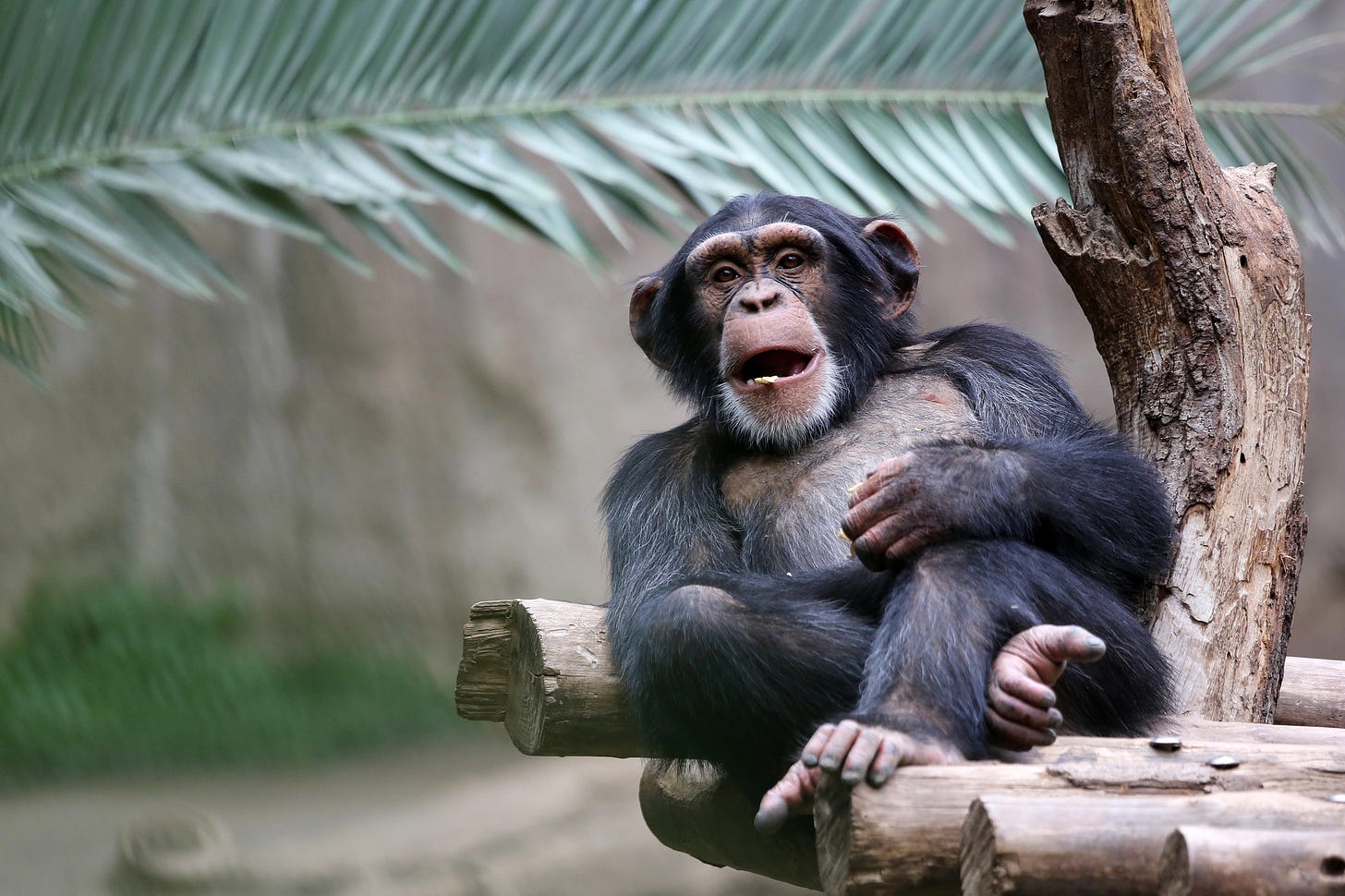Highly Evolved
With a lot to learn
We are an arrogant lot, we humans. We sit on the top rung of the ladder of life – we are smart, inventive, creative, capable of great good and unspeakable evil. We dominate our planet and feel entitled to rule, dictate, choose, and make judgments. From our evolutionary throne, we can literally look down on other beings. Like four-legged critters, winged things, swimmers, floaters, and crawlers.
So, to establish a wider spectrum of respect for beings that survive despite having much smaller brains and (generally) no opposable thumbs, I want to highlight some other earthly creations that display awesome traits that usually evade human beings.
Let's start out with primates. You and I are members of this remarkable Order of Mammals. The Order includes more than 500 species, with new members still being discovered today. Humans and our (sometimes) distant cousins – monkeys, apes, and lemurs owe existence to a shared ancestor about 60 million years ago. (I know you're thinking that doofus down the street with the junk cars and loud music might have missed the early train to evolution).
Dominating the world at the top of the genomic pyramid and having invented things like hair in a can, the Segway, tanning beds, the parachute jacket, the Ford Pinto, and pop-up ads, humans take pride in the fact that no other mammal can claim such accomplishments. But I'm here to tell you – that's just because most of us don't give our cousins due credit.
For example – Orangutans don't need to rush off to the jungle's emergency room at the first sign of a nasty booboo. Scientists in Sumatra followed an Orangutan named Rakus through a forest and were concerned when they saw a nasty wound on the 35-year-old's face. But then, he paused by an akar kuning plant (yellow root to English speakers) and popped the plant into his mouth. Because Tukus and his home boys don't eat yellow root, this stumped the pants-wearing scientists. Tukus chewed a bit and then spit the masticated mound into his hand and rubbed it into the wound. The plant has healing properties and is used as a remedy by native humans who don't gracefully swing through trees on the island.
Chimpanzees in Central Africa chomp up certain bugs, then spit out and rub the mash onto wounds. Other primates eat particular leaves known to kill parasites and treat infections. But it's not just primates that show such useful behaviors without a high school education. Among the smartest in the class are civets that swallow leaves to cure worm infestation, birds that rub their bodies with ants to treat mites, and even bees known to medicate themselves and their homeboys in the hive. To make animal instincts even more awesome, researchers have discovered chimps in Tanzania devouring leaves with antibiotic properties that hold the potential to help cure cancer in humans.
Of course, human researchers were quick to create a word that only humans with advanced degrees can learn to spell or pronounce to represent these awesome traits in animals – Zoopharmacognosy.
Here's the definition of that word I just spelled correctly for the first and only time in my life: Zoopharmaxxx… "is a behavior in which non-human animals self-medicate by selecting and ingesting or topically applying plants, soils, and insects with medicinal properties, to prevent or reduce the harmful effects of pathogens, toxins, and even other animals."
Of course, one doesn't have to be a primate to develop healthy habits. Alaskan Brown bears hibernate over long winters to avoid shoveling snow. But when they open their eyes in the spring, they chow down on Carex Leaves. This comes after the long sleep when tapeworms safely hang out in their stomachs. The leaves attach to the bear's old nutrients in the stomach and send the tainted contents packing – answering the eternal question – why does a bear poop in the woods.
A particularly human behavior resides in the kingdom of African elephants. While waiting to give birth to 260-pound babies, expectant moms chow down on the leaves of trees in the forget-me-not family. Why? The same reason that expectant Kenyan women make tea from the leaves - to induce labor.
Clearly, if animals lack big brains and will never learn to drive a car (check that – I think some chimps manage to pass the driver's test), humans, the inescapable force on our planet (with the exception of Mother Nature who kicks everyone's butt) are capable of truly positive, life-changing innovations. However, currently, in the United States and other powerful nations, we are preoccupied with humanity's dark side in hot spots around the world. The specter of danger blots out the sun. But since we share up to 99 percent of DNA with our prehensile cousins, all is not lost if we can just find a plant that wipes out our worst human instincts.
Thanks for being with me and supporting my lifelong love affair with the written word. Special gratitude to those of you who send along my blogs to share with friends and to paid subscribers at just $5 a month.
And if you have someone who enjoys a good mystery - consider my highly rated “The Song of Jackass Creek.” Based on character and place, lacking graphic violence - readers have logged great reviews - check them out!


